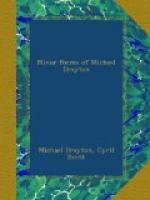In his later years Drayton enjoyed the patronage of the third Earl and Countess of Dorset; and in 1630 he published his last volume, the Muses Elizium, of which he dedicated the pastoral part to the Earl, and the three divine poems at the end to the Countess. The Muses Elizium proper consists of Ten Pastorals or Nymphals, prefaced by a Description of Elizium. The three divine poems have been mentioned before, and were Noah’s Floud, Moses his Birth and Miracles, and David and Goliah. The Nymphals are the crown and summary of much of the best in Drayton’s work. Here he departed from the conventional type of pastoral, even more than in the Shepherd’s Garland; but to say that he sang of English rustic life would hardly be true: the sixth Nymphal, allowing for a few pardonable exaggerations by the competitors, is almost all English, if we except the names; so is the tenth with the same exception; the first and fourth might take place anywhere, but are not likely in any country; the second is more conventional; the fifth is almost, but not quite, English; the third, seventh, and ninth are avowedly classical in theme; while the eighth is a more delicate and subtle fairy poem than the Nymphidia. The fourth and tenth Nymphals are also touched with the sadder, almost satiric vein; the former inveighing against the English imitation of foreigners and love of extravagance in dress; while the tenth complains of the improvident and wasteful felling of trees in the English forests. This last Nymphal, though designedly an epilogue, is probably rather a warning than a despairing lament, even though we conceive the old satyr to be Drayton himself. As a whole the Nymphals show Drayton at his happiest and lightest in style and metre; at his moments of greatest serenity and even gaiety; an atmosphere of sunshine seems to envelope them all, though the sun sink behind a cloud in the last. His music now is that of a rippling stream, whereas in his earlier days he spoke weightier and more sonorous words, with a mouth of gold.[24]
To estimate the poetical faculty of Drayton is a somewhat perplexing task; for, while rarely subtle, or rising to empyrean heights, he wrote in such varied styles, on such various themes, that the task, at first, seems that of criticizing many poets, not one. But through all his work runs the same eminently English spirit, the same honesty and clearness of idea, the same stolidity of purpose, and not infrequently of execution also; the same enthusiasm characterizes all his earlier, and much of his later work; the enthusiasm especially characteristic of Elizabethan England, and shown by Drayton in his passion for England and the English, in his triumphant joy in their splendid past, and his certainty of their future glory. As a poet, he lacked imagination and fine fury; he supplied their place by the airiest and clearest of fancies, by the




